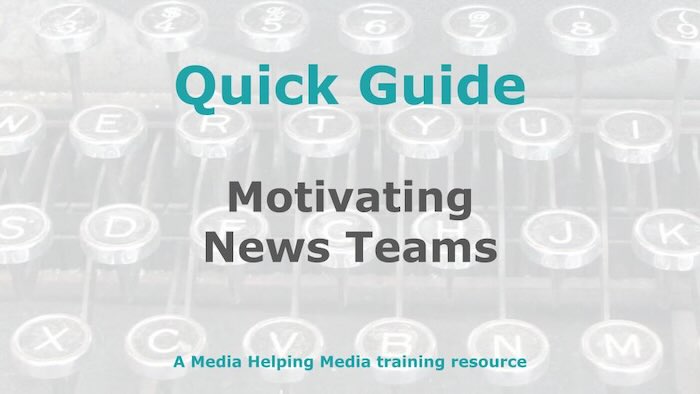
Daily news meetings should be inclusive and agenda-setting. Editors must foster a culture of original ideas and risk-taking to keep staff motivated and alert.
The news meeting should be something members of your news team prepare for and look forward to, not sleep through or dread.
They should arrive eager to get their story ideas accepted and there should be an atmosphere of risk-taking and adventure.
To achieve this editors must motivate staff, develop an ideas culture and ensure people are alert and involved.
They need to keep the news meetings moving and allow enough time for discussing story development and treatment.
The following suggestions have been offered by media professionals.
How to get more out of your journalists
Encourage ideas
Former BBC journalist and media trainer Bob Doran says it’s important for the editor to go round the team asking journalists one by one what ideas they have.
“It’s best to limit them to two ideas each the first time round, otherwise the ideas can get swept up by the first couple of people, which is demoralising for the rest. Those with lots of ideas can always have another go once everyone else has had their say.”
Instil confidence
Rod McKenzie, editor of BBC Radio 1 & 1Xtra’s Newsbeat says coming up with ideas can be as much about a state of mind for journalists as about having sources.
“Young journalists can be locked in fear of getting it wrong or sounding foolish. They need confidence. That leads to more ideas, which means more confidence, which produces more ideas, and so on. This confidence stems from knowledge. They need to know their stuff. Creativity is about risk taking. Encourage the team to stick their necks out. Don’t humiliate them if they miss the mark. Acknowledge what they did right and explain what could be improved.”
Keep their feet on the ground
Former BBC editor and media trainer Ian Parkinson says it’s important to ensure your journalists stay in touch with the audience.
“Make sure your reporters and producers are aware of the issues that most concern your audience and are able to pick up on interesting angles. Encourage them to get out of the office, talk to the man and woman in the street. Ask them what issues they want to hear covered on the radio, watch on TV or read in their newspaper. Try to find out what’s worrying them, what they are talking about with their friends, even what they are going to be doing after they finish work.”
Make sure they read between the lines
Rod McKenzie also says it’s important for journalists to look for stories in the news they consume.
“Your journalists may need to be encouraged to read more intelligently. They need to read in order to find stories. They need to keep up to date by reading newspapers, magazines, websites and blogs, and they need to question all they read and always be on the lookout for new stories and new angles to explore.”
Insist on evidence
Bob Doran also insists on journalists supporting story ideas with facts.
“Make it clear that only stories based on clear evidence will be considered. You can’t afford to waste time discussing stories that are based on unfounded rumour. Sometimes journalists don’t have the facts to sustain their idea. That’s fine, as long as the premise for the story is firm. They need to find those facts, check them, test them, attribute them where possible, and remain alert in case the facts they uncover lead to other stories.”
Praise them when things go well
Bob Doran adds that a pat on the back worked wonders.
“Start the meeting by pointing out what worked well the previous day, edition, bulletin, programme. If one of your journalists had an exclusive, or found an angle that the competition missed, make a point of highlighting it. Even consider discussing how it was developed in order to encourage others.”
Pitch in and show the team you can do the job too
Sam Obbo, a media consultant from Uganda says that it is important that editors pitch in.
“Once in a while an editor should get off his or her arse and be a foot-soldier like his or her reporters/ camera crews. Many editors — especially those who hardly went into the trenches when they were debutants — are contented with bellowing out orders from their seats. They lack empathy for reporters and photographers/ camera crews.”
Show your journalists you appreciate them and mean it
Abel Dzobo, Operations Director Kreativehive Corps says editors often do not appreciate journalists enough and should consider letting them cover the stories and issues that mean most to them.
“Some editors believe if you tell journalists that they are doing well, they get big-headed. But not getting noticed is a very big de-motivating factor. Sometimes a journalist develops an interest in a certain beat, for example a friend or loved one might have passed on due to cancer. Giving them space to tackle the disease is a great motivational factor, rather than ordering them to keep to their original beats.”
Connect with your team
Magda Abu-Fadil, Director at Media Unlimited, says it’s important that the editor is seen as one of the team and is not an aloof boss.
“Lead by example: pitch in with heavy lifting when needed. Inspire, don’t badger. Encourage. Be respectful. Have a sense of humour (self-deprecating is encouraged). Admit mistakes. Accept criticism. Be gracious. Be humble.”
Let them enjoy their own success
Harishchandra Bhat says it is important to give journalists enough room to express themselves.
“Journalists get motivated by their own success. Human interest stories, vows of commoners, lacunae in the policy matters of Governance, Appreciable pieces of art, Good themes of society and any other public interest article written by the journalist would bring pleasure to him/her. Motivation starts from there.”
And if all these tips fail, threaten them
Dan Ehrlich, a newspapers professional, takes a no-nonsense old school approach. He says that when met with a mini rebellion at the local US TV newsroom he was running he called a general news meeting and “laid it all out in no uncertain terms”. He says he recalls it went something like this:
“I’m at the end of my career ladder. For me this is overtime. There’s nothing you can really do that will hurt me. But, you people, however, are just starting your climb. And you will need all the help you can get. As I see it, you have two choices – you can be my buddy and I will guarantee to help you get out of here and to a good station or you can be my adversary and get screwed.”









